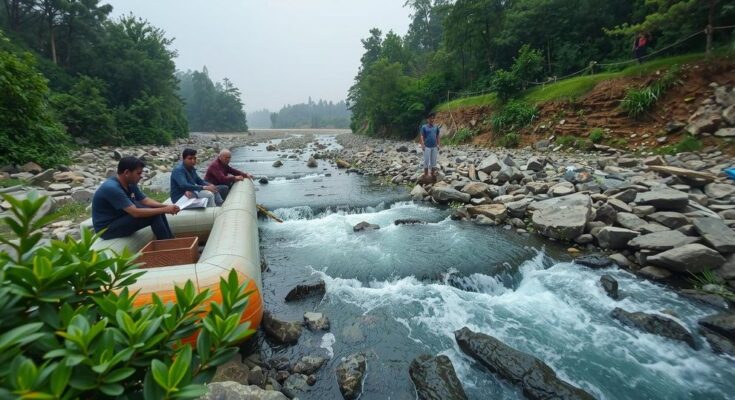Uzbekistan’s envoy, Ismatullah Irgashev, clarified that Afghanistan has the right to draw water from the Amu Darya River, highlighting the importance of negotiating how much water each country will allocate, especially considering the river’s reduced flows. He mentioned the establishment of a joint commission to discuss the Qosh Tepa Canal project, which aims to utilize a significant volume of the river’s water while assuring that there are no conflicts with the Islamic Emirate of Afghanistan.
Uzbekistan’s special representative for Afghanistan, Ismatullah Irgashev, has affirmed that Afghanistan has the right to utilize water from the Amu Darya River. However, Irgashev emphasized that the main concern lies in determining the allocation of water between the two countries, particularly in light of the river’s diminishing levels. He noted the establishment of a joint commission between Uzbekistan and Afghanistan aimed at discussing the construction of the Qosh Tepa Canal. The Qosh Tepa Canal is projected to span 285 kilometers in length, with a width of 100 meters and a depth of 8.5 meters. It will draw approximately 10 cubic kilometers of water annually from the Amu Darya River, which constitutes roughly 20% of the river’s overall volume. Although Uzbekistan has expressed apprehension regarding the canal’s potential impact on the region’s water dynamics, Irgashev assured that there exists no conflict with the Islamic Emirate of Afghanistan (IEA) over this water allocation issue. He stated, “There are no problems between us. The question is which country will use how much, as well as the quota for its use, taking into account shallowing of the river.” In response to these developments, the IEA has indicated its confidence that Uzbekistan would not suffer adverse effects from the canal’s construction, suggesting a cooperative approach to managing shared water resources in the region.
The Amu Darya River is crucial for several countries in Central Asia as it serves as a significant water source. The diplomatic relations between Afghanistan and Uzbekistan are particularly important for resource management, given their historical context and the ongoing challenges of water scarcity in the region. The proposed Qosh Tepa Canal is a focal point of cooperation, yet it has raised concerns regarding its impact on the river’s flow and the water rights of both nations. This situation highlights the delicate balance required in addressing mutual interests in water resource allocation amidst environmental concerns.
The discussion surrounding Afghanistan’s right to the Amu Darya River’s waters underscores the importance of diplomatic engagement between Uzbekistan and Afghanistan. The establishment of a joint commission and ongoing dialogues reflect a commitment to collaboratively address water management challenges. Both nations can benefit from a cooperative framework, ensuring that their water needs are met sustainably while maintaining regional stability.
Original Source: www.ariananews.af




